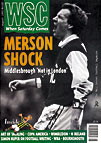 Bournemouth were nearly extinct due to their financial situation, but Rob Trent tells the happy story of their revival
Bournemouth were nearly extinct due to their financial situation, but Rob Trent tells the happy story of their revival
“This afternoon at just after four o’clock the assets of AFC Bournemouth, the stand, the stadium, the name, the players, have all been transferred into the hands of the community club.” Thus spoke Trevor Watkins, the new Chairman of AFC Bournemouth, on 18th June 1997.
Just six months earlier, following over a decade of apparent financial mismanagement, AFC Bournemouth were on the brink of closure after Lloyds Bank finally ran out of patience and called in the receivers. In December 1996, Chairman Ken Gardiner resigned just as the club were about to go before the local council and ask for financial support for a new stadium. His resignation was followed by further resignations, and the typical squabbling and in-fighting amongst ex-directors, each blaming the other for past mistakes.
Financial problems at lower division clubs are nothing new. Both Middlesbrough and Wolverhampton Wanderers recovered from their problems, and now have bright futures ahead of them (well, neither do really, but you take my point). Since those days, the Football League, embarrassed by the amount of clubs folding and starting again under a new name, tightened their rules. Early comments concerning our plight from League chairman David Sheepshanks were less than encouraging. In fact, at times it felt as if the Football League were the major players in the attempt to prevent us from starting the new season.
If the arrival of the receiver (Alan Lewis, a Crystal Palace fan) was the darkest hour, then three days later we saw our first chink of light. Backed by enormous publicity, a meeting was held at the Winter Gardens to launch a fighting fund. The venue was packed out, and over £30,000 was raised that evening alone. The first home game after that meeting saw more than 8,000 fans in Dean Court. An immediate question sprang to mind: where were these people when we needed them? Putting on their Man Utd and Liverpool tops and watching bloody Sky, that’s where.
Pubs, clubs and businesses around the town all did their bit, backed superbly by the players, who didn’t know if they would have a job from one week to the next. Seventies icon Ted MacDougall flew from his home in Canada, making a round of public appearances, including a five-minute appearance in a fund raising friendly with Southampton to help the cause. Goodwill (and cash) from fellow football fans was also in abundance. It was clear that AFC Bournemouth would not be allowed to die.
Another thing was also clear. Despite rumours about wealthy English/Japanese/Arab businessmen, there would be no consortium stepping in to save the club. Pop promoter Mel Bush, a long time season-ticket holder, had been silent all this time. Eventually it was left to the Trust Fund, backed by local businesses, to put in a bid to save the club.
There are those who might have considerable sympathy with Lloyds Bank, owed some £2.5 million of the total £4.4m debts. But, it needs stressing that Lloyds took over £3m in interest payments over 10 years, they called in the receivers even though the club had not defaulted on a single repayment, and that during the take-over negotiations they moved the goalposts so many times that even Ronaldo might have struggled to find the back of the net.
But, thanks to a concerted effort by the whole community, plus the generosity of numerous creditors who agreed to accept a much smaller slice of the cake, we still have a club. No: our club. Not only that, but the club is supposedly unique in Europe in that it is run by the community, and not by the kind of megalomaniacs which have brought the likes of Brighton and Hull almost to their knees. The Trust Fund which now runs the club will own 51% of the shares. We are promised more accountability, greater openness, and regular forums with the supporters.
As any fan knows, these are easy things to promise, much harder to deliver. If it works, then hopefully other clubs will follow the example. For AFC Bournemouth fans, 18th June was the day that we knew we’d still have a team to watch.
From WSC 126 August 1997. What was happening this month